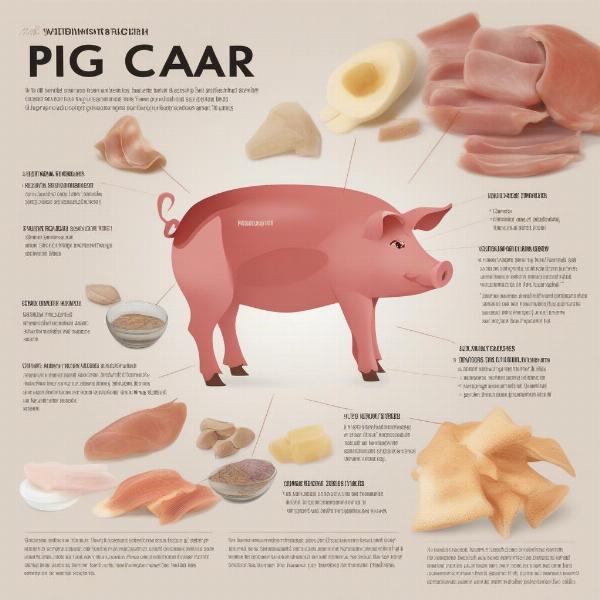Pig ears are a popular chew treat for dogs, offering a satisfyingly chewy texture and a delicious porky flavor. But are all pig ears created equal? This guide will delve into everything you need to know about choosing the best pig ears for your canine companion, covering safety, nutritional value, and how to select high-quality options. We’ll also address potential concerns and provide tips for responsible pig ear enjoyment.
Understanding the Appeal of Pig Ears
Dogs love to chew, and pig ears offer a natural outlet for this instinct. The tough, cartilaginous texture provides a long-lasting chewing experience, which can help alleviate boredom, reduce anxiety, and promote healthy teeth and gums. The natural flavors found in pig ears are also highly appealing to most dogs.
Choosing the Right Pig Ears: Quality Matters
Not all pig ears are the same. Quality varies significantly depending on the sourcing and processing methods. Look for pig ears that are:
- Naturally dried: Avoid pig ears that are smoked or artificially flavored, as these can contain harmful chemicals.
- Free of additives: Choose pig ears with minimal processing and no added sugars, salt, or preservatives.
- Sourced responsibly: Opt for pig ears from reputable suppliers who prioritize ethical and sustainable farming practices.
Nutritional Value and Potential Risks of Pig Ears
 Pig Ear Nutrition Facts
Pig Ear Nutrition Facts
Pig ears are a good source of protein and chondroitin, which can support joint health. However, they are also high in fat and calories, so moderation is key. Potential risks associated with pig ears include:
- Salmonella or E. coli contamination: Always choose properly processed pig ears and wash your hands thoroughly after handling them.
- Digestive upset: Some dogs may experience diarrhea or vomiting if they consume too many pig ears.
- Choking hazard: Supervise your dog while they are chewing on a pig ear, especially if they are a powerful chewer, and remove any small pieces that break off.
Are Pig Ears Safe for Puppies and Senior Dogs?
Puppies with developing teeth can usually handle pig ears, but supervision is essential. For senior dogs with dental issues, softer chews might be a better option. Always consult your veterinarian if you have any concerns about your dog’s ability to safely consume pig ears.
How to Make Pig Ears Last Longer
To extend the chewing enjoyment and reduce the risk of choking, consider these tips:
- Offer pig ears in moderation: Limit pig ear consumption to a few times a week.
- Supervise chewing sessions: Always watch your dog while they are enjoying a pig ear.
- Discard small pieces: Remove and discard any small or brittle pieces to prevent choking.
Alternatives to Pig Ears
If you’re looking for alternative chews, consider options like bully sticks, dog pig ears or tripe for dogs raw. Always choose chews that are appropriate for your dog’s size, age, and chewing habits.
FAQs
- Are smoked pig ears safe for dogs? Smoked pig ears often contain harmful chemicals and should be avoided.
- Can pig ears cause pancreatitis? While not a direct cause, the high fat content in pig ears can exacerbate pancreatitis in susceptible dogs.
- How often can I give my dog a pig ear? Offer pig ears in moderation, a few times a week at most.
- What should I do if my dog chokes on a pig ear? Seek immediate veterinary attention if your dog is choking.
- Are there any hypoallergenic pig ear alternatives? Yes, there are various hypoallergenic chews available, such as those made from sweet potato or rice flour.
- Can I give my dog a pig ear if they have allergies? If your dog has allergies, consult your veterinarian before introducing any new treats, including pig ears.
- What are the signs of a pig ear allergy in dogs? Signs of a food allergy can include itching, skin redness, gastrointestinal upset, and ear infections.
Conclusion
Pig ears can be a healthy and enjoyable treat for dogs when chosen and offered responsibly. By prioritizing quality, practicing moderation, and supervising chewing sessions, you can help ensure that your dog enjoys the benefits of this popular chew while minimizing potential risks. Always remember to consult with your veterinarian if you have any specific concerns about your dog’s diet or health.
About ILM Dog
ILM Dog is your trusted resource for expert dog care advice and information, covering everything from breed selection and puppy care to senior dog health and training tips. We are dedicated to providing practical, evidence-based guidance to help you navigate all aspects of dog ownership. From nutrition and grooming to health concerns and product recommendations, ILM Dog is here to support you and your furry friend throughout every stage of their life. Contact us at [email protected] or +44 20-3965-8624 for personalized advice and to learn more about our services.